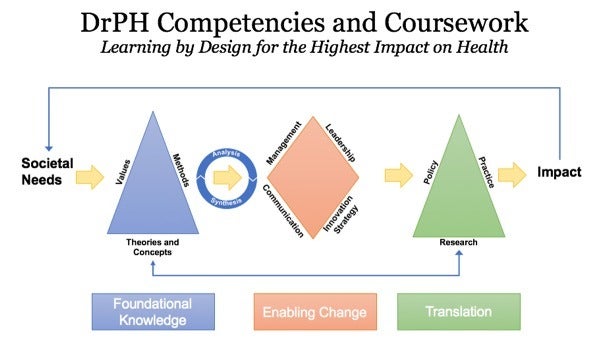The DrPH Program integrates foundational knowledge, such as public health theories and methods; enabling change competencies of leadership, management, communication, and innovation; field immersions; and a field-based doctoral project culminating experience to prepare graduates to translate knowledge into action. To this end, the DrPH Program has developed a learning method to achieve doctoral engagement in leadership and translation for action.
The first two years of the Harvard DrPH follow a cohort model combining full-time, on-campus study with real-world, practical, Field Immersion experiences.

Year three focuses on the culminating experience for the degree—the DrPH Doctoral Project, which is launched with an oral qualifying exam on the student’s project proposal. Students are typically embedded in a nonprofit, governmental, or for-profit organization. They are supervised by a Doctoral Project Committee with whom they work closely during the year and design deliverables, including the DrPH Doctoral Thesis, required for graduation.
Read on to learn more about the Core Curriculum’s Foundational Knowledge and Enabling Change programs and Learning Across Harvard. For more information on the DrPH Program Competencies, please click here.
Foundational Knowledge
Students matriculate at the beginning of July, with the summer term intensive, which immerses them in fundamental theories, concepts, and methods. Students continue with foundational coursework during the first two semesters of the first academic year, which includes critical public health history, economics, politics, policy, and public health-related social sciences. Students also study quantitative and qualitative analysis and research methods, including biostatistics, epidemiology, and econometrics/multivariate statistics methods. At the end of the first year, all students will take a Written Qualifying Exam (WQE) to assess integrative thinking and problem-solving between and across foundational coursework.
In their second year, students are encouraged to develop more individualized interests and direction leading toward their DrPH Doctoral Project. Depending on availability, students can choose from coursework at Harvard T.H. Chan or other Harvard schools, such as the Harvard Business School and the Harvard Kennedy School.
Below are samples of the course requirements/waivers, curriculum course map, and course schedules for Year 1 and Year 2. Please be advised these are only samples; all schedules, course maps, and requirements/waivers are subject to change. The course schedules/map denote the school-wide or program-required courses all students must take. Students must also complete ten credits of method courses and have the opportunity to take electives.
| Curriculum Course Map | DrPH Course Requirements and Waivers |
| Sample Year 1 Schedule | Sample Year 2 Schedule |
Enabling Change
The Enabling Change program within the Harvard DrPH reflects our belief that effective public health leaders and practitioners must augment traditional public health research skills and methodologies by learning how to enable positive change at four levels of application: within themselves, through teams, in organizations, and across systems. These skills are developed through a sequence of courses that includes personal mastery, focusing on core competencies individuals must engage in fostering change in others, and coursework in leadership, management, communication, and innovative thinking, competencies that prepare students to innovate and enable change through teams, in organizations, and large-scale systems. The Enabling Change sequence also includes peer and executive coaching focusing on personal development at all levels of application.
Immersive field experiences contribute to an effective DrPH Enabling Change program. Through the Fall II, January, and Spring I terms, student teams work with a host organization and a faculty mentor to develop a robust teaching case reflecting on complex organizational decision points or challenges. Summer Field Immersion aims for students to concentrate on developing new competencies and advancing existing skills while addressing a public health issue or challenge of personal interest. This full-time, 8-10 week experience between May-August is arranged between the student and their host organization.
Other learning activities include periodic DrPH Community Block with the DrPH Team, including visiting Harvard T.H. Chan School leadership fellows/invited speakers and fireside chats.
Learning Across Harvard and Other Schools in the Area
As part of Harvard T.H. Chan School of Public Health, DrPH students are eligible to take elective classes at other schools within the cross-registration consortium consisting of other Harvard faculties, the Massachusetts Institute of Technology (MIT), Tufts’ Fletcher School of Law and Diplomacy and Friedman School of Nutrition Science and Policy. More information can be found here.
Back to top



